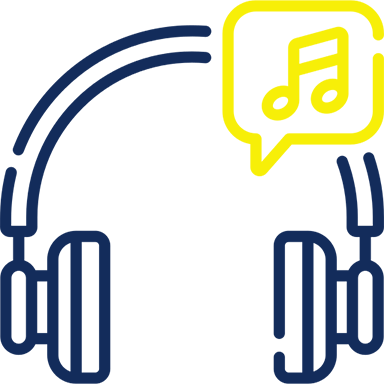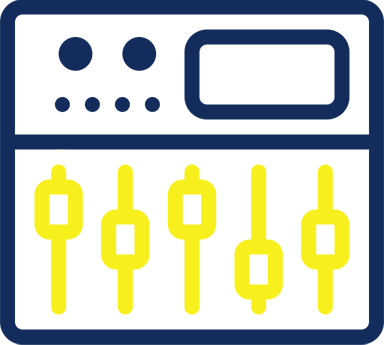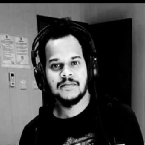Frequently Asked Questions
Music production is the method of creating and developing authentic music which becomes the best to appeal to the audience. Every music producer professional is in the control of shaping the sound of individual music tracks and leading the overall vision of an album. Music producer provides their
complete assistance to the artist in their recording project by bringing creative imagination to fulfillment & leading the way till its finished track.
A music producer is someone who makes sure that the song is Well recorded & Well produced that provides top-notch results at the end. They offer advice to band or singers regarding techniques aspects of the performance & check whether engineers are working at their finest.
The music producer is regarded as a life process of music that involves multiple roles from songwriting and composition to recording and sound design to mixing and mastering.
Learn to play Instrument:-
Though music producer doesn’t play instruments professionally they should be aware and know how to play instruments like guitar, a piano or a keyboard, or even a violin & able to read music sheets.
You don’t have to be an expert but basic knowledge could be helpful for your career to strike in the music production industry. Learning an instrument will help you create a record of your own sounds rather than waiting for musicians to develop jingles.
Training your ears:-
Aspiring musicians need to be students of music & work on training their ears by listening to different genres of music from numerous eras. Listening to other artist’s song you will learn to acknowledge rhythm, tempo, harmony. Analyzing the theme of the song will provide you with small unique details which regular listeners may not notice in the production.
Familiarize yourself with DAW :-
You will be working on a Digital audio workstation or DAW while recording or producing music. As a newcomer, you don’t need to invest in costly audio systems. You can get access to some of the most approved DAW’S that u can simply download are Pro Tools, Ableton Live, and Logic Pro X. Learning overall inside-out of your DAW’S & understanding how each button functions will guide you in the long haul while creating a record.
Join a professional Music Production Institution:-
You can get access to lots of free music production sessions online, it may help you to learn to some extent. However, to get certified and become a professional music producer one has to enroll in a professional music production institute. Learning along with other music lovers & getting personal attention at the music production institute with help enhance your music skill & improvise rapidly.
Learning Music theory:-
Learning music theory is an essential part of the progression of your musical development. Music theory briefs us on how music works & shows us a way forward. You need to learn how to compose & create a song using DAW &
other related music production equipment.
Music theory will help you to figure out why a particular note is
used in the track or why the notes are arranged high or low in
certain sections of the song.
In the end, Learning & understanding music theory with the help
of DAW will help you gear your chances to become a professional
musician & have a successful path in the music industry.
For an entry level Music Producer with less than 3 years of experience can expect an average total remuneration(includes tips, bonus, and overtime pay) of ₹ 2,87,600 or more.. A mid-level career Music Producer with 5-9 years of experience earns an average total remuneration of ₹400,000 or more..
Music Producer Salary in India (2022) | Jobted India
A passion for music plays a key role for any music producer.
However, there are no fixed education criteria for becoming a music producer.
Sometimes bachelor’s degree in music production or a related field can be beneficial for aspiring candidates.
Composition:-
Composition is a creative stage in creating music. It involves identifying melodies, harmonics, and rhythms. The decisions made during this stage are what which define’s a song’s genre, vibe, and style. Next, you’ll have to materialize your ideas or bring them to life, As for musicians, this means taking their idea to the next level by
writing down lyrics, laying down chords on a guitar, or hitting piano notes to create a melody.
You can start with a piece of music that is just a loop or phrase to build on until you have a full composition.
The following principles of music theory will greatly assist you in developing your idea so that it sounds pleasing and appealing.
These include Rhythm Melody Harmony All of your creation will revolve around these 3 pillars of music theory to produce music that sounds amazing.
Arrangement:- An arrangement is a method of taking your musical ideas and putting them together into a finished piece.
Arranging is the stage where you create the intro, verse, chorus, bridge, and outro Arranging is the process of connecting musical ideas in a way that can be easily absorbed and understood, flowing from one phrase to the next with a sense of beginning, and then taking the listener along for the ride An arrangement refers to how the instruments playing in each section of the song have been chosen or “arranged”.
It also refers to how the sections themselves have been arranged within the overall structure of the song.
Editing:-
This is the stage where you nudge the various parts to fit together by dragging, dropping, cutting, trimming, copying, and pasting.
You’ll need to make small edits, such as adding and removing instruments, adjusting automation levels, or lengthening or shortening certain sections.
However, it is common to find that musicians, engineers, and producers tend to get so caught up in the little details at this critical stage.
To make things more polished Editing should concentrate more on moving or adjusting pitch, fading the beginning or end of parts, adjusting pitch, if necessary.
Mixing:-
Mixing is the process of adjusting the levels of audio to achieve the
desired sound.
During this stage, you can also modify and clean up transitions and
remove tracks that don’t contribute much to the overall mix.
An effort is made to mix the tracks so that the audience can grasp
the true meaning of the songs.
There are various audio effects you can use, such as EQ, delay, reverb, compression, and distortion.
Even so, mixing your tracks won’t make up for poor lyrics or poorly recorded instruments. Depth, range, and height should all be present
in a good blend. Mixing your music takes a lot of effort, patience, and good listening skills. Mixing is the process of combining levels, EQ, panning, and effects to achieve the stereo image and final sound you desire.
Mastering:-
Mastering is the way of transforming your mix for the general public or release while retaining the highest possible sound quality. It must give the listener the most correct interpretation whether it is broadcast, downloaded, or streamed on a hi-fi system, headphones, automobile system, or any other playback method.
To ensure that the track is loud enough, has a nice stereo image, and sounds professional, a variety of approaches and tools are used. The audio engineer focuses on the entire song, EP, or album as a whole from beginning to end during mastering
Assume you are a legal professional. Without legal understanding, you will be unable to file a lawsuit or represent your clients in court.
Consider becoming a doctor. You’ll find it difficult to practice medicine if you lack the necessary knowledge.
Producers of music are in the same boat. They won’t be able to create superior sound unless they master instruments, songwriting, recording procedures, and software. As a result, to be effective in today’s modern recording industry, you must be fluent in the language of music.
Music creation isn’t easy, and it’s certainly not rocket science. To become a professional, all you need is a deep assessment and mastery of music theory, MIDI, mixing, mastering, arrangement, software, equipment, composition, sound design, digital tools, and countless years of practice. Enrolling in a music school can help you learn the fundamentals of music production and get you started as a music producer.
There’s a lot to learn about music production since it necessitates a lot of creativity. Audio Production and Engineering courses prepare you to create the professional sound for a wide range of applications, including live concert mixing, film production, radio, video game production, corporate events, digital media, and theatre. You’ll be able to compose, construct, and enhance recorded music for public performance thanks to the ideal combination of theoretical learning and practical practice. Songwriting, composing, recording, sound design, mixing, and mastering are all aspects of music production.
For those that are truly passionate about music, music producing is a wonderful career option. Composers are creative individuals that forego comfort and peace of mind in exchange for fortunes.
If you can solve problems on your feet and lead others, music production is a superb professional option for you.
Nowadays, the boundaries between a musician and a music producer are melting, especially in the independent sphere, where anyone writing and recording music at home is considered a producer.
You can also consider yourself a producer if you are mixing or mastering music. The majority of folks begin their careers in the music industry as musicians.
They are fascinated by music but will most likely train to play an instrument at an early age.
Nevertheless, as years progress, some people are drawn to the recording process, while others are drawn to mixing or beat-making.
Genuine producers, on the other hand, are those who grasp the recording process.
They’re the ones who can tell what’s nice quality across a sea of similar sounds.
They keep a close watch on talent and maintain their ears open like radars all the time.
In a song that has just burst to life, producers can hear something others can’t.
The majority of folks begin their careers in the music industry as musicians. They are fascinated by music but will most likely train to play an instrument at an early age. Nevertheless, as years progress, some people are drawn to the recording process, while others are drawn to mixing or beat-making. Genuine producers, on the other hand, are those who grasp the recording process. They’re the ones who can tell what’s nice quality across a sea of similar sounds.They keep a close watch on talent and maintain their ears open like radars all the time. In a song that has just burst to life, producers can hear something others can’t.
To genuinely become a professional, though, you must prioritize and develop vital skills. Online courses can be beneficial, but in our industry, nothing surpasses hands-on experience.
To genuinely become a professional, though, you must prioritize and develop vital skills. Online courses can be beneficial, but in our industry, nothing surpasses hands-on experience.
The pros and cons of music production as a vocation are a matter of personal preference and objective assessment of skill sets and ambition. Music is in high demand in the market, with cable and specialized TV stations requesting programming as an example of a developing segment. The high cost of recording equipment, on the other hand, ensures that many people can compete. To address the ever-changing needs of music production, creativity and adaptability are required.












